最新初三中考英语词语辨析专项
- 格式:pdf
- 大小:78.78 KB
- 文档页数:3
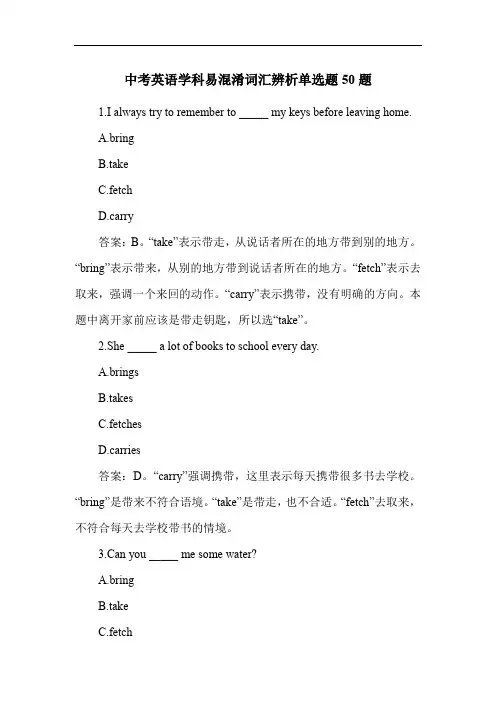
中考英语学科易混淆词汇辨析单选题50题1.I always try to remember to _____ my keys before leaving home.A.bringB.takeC.fetchD.carry答案:B。
“take”表示带走,从说话者所在的地方带到别的地方。
“bring”表示带来,从别的地方带到说话者所在的地方。
“fetch”表示去取来,强调一个来回的动作。
“carry”表示携带,没有明确的方向。
本题中离开家前应该是带走钥匙,所以选“take”。
2.She _____ a lot of books to school every day.A.bringsB.takesC.fetchesD.carries答案:D。
“carry”强调携带,这里表示每天携带很多书去学校。
“bring”是带来不符合语境。
“take”是带走,也不合适。
“fetch”去取来,不符合每天去学校带书的情境。
3.Can you _____ me some water?A.bringB.takeC.fetch答案:A。
“bring”表示带来,这里是让对方给自己带来一些水。
“take”带走不对。
“fetch”去取来,没有“bring”直接。
“carry”携带,不是此处的意思。
4.He went to the library to _____ a book.A.bringB.takeC.fetchD.carry答案:C。
“fetch”表示去取来,去图书馆取一本书符合这个意思。
“bring”带来,从图书馆的角度不是带来。
“take”带走,不太准确。
“carry”携带也不合适。
5.She _____ her baby in her arms.A.bringsB.takesC.fetchesD.carries答案:D。
“carry”表示携带,这里是她把宝宝抱在怀里,用“carry”合适。
“bring”带来不符合。
“take”带走不对。
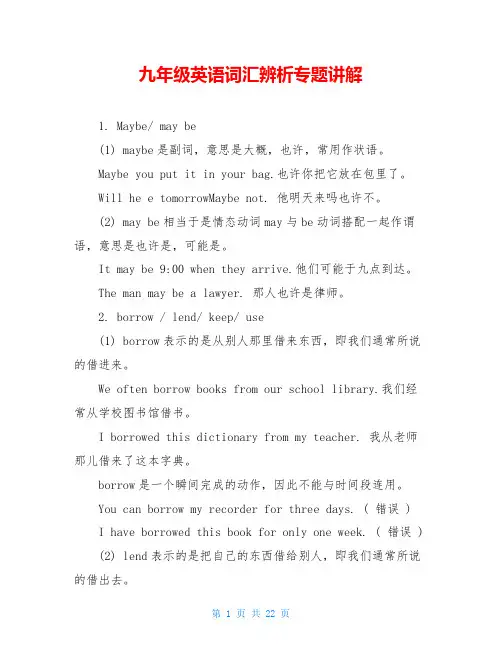
九年级英语词汇辨析专题讲解1. Maybe/ may be(1) maybe是副词,意思是大概,也许,常用作状语。
Maybe you put it in your bag.也许你把它放在包里了。
Will he e tomorrowMaybe not. 他明天来吗也许不。
(2) may be相当于是情态动词may与be动词搭配一起作谓语,意思是也许是,可能是。
It may be 9:00 when they arrive.他们可能于九点到达。
The man may be a lawyer. 那人也许是律师。
2. borrow / lend/ keep/ use(1) borrow表示的是从别人那里借来东西,即我们通常所说的借进来。
We often borrow books from our school library.我们经常从学校图书馆借书。
I borrowed this dictionary from my teacher. 我从老师那儿借来了这本字典。
borrow是一个瞬间完成的动作,因此不能与时间段连用。
You can borrow my recorder for three days. ( 错误 )I have borrowed this book for only one week. ( 错误 )(2) lend表示的是把自己的东西借给别人,即我们通常所说的借出去。
Thank you for lending me your bike.谢谢你把自行车借给我。
He often lends money to his brother.他经常借钱给他弟弟。
lend与borrow一样,也是一个瞬间完成的动作,不能与一段时间连用。
(3) keep的意思也是借,但一般是指借来后的保存或使用阶段,是一段持续的时间,因此可以与时间段连用。
You can keep my recorder for three days.我的录音机你可以借用三天。
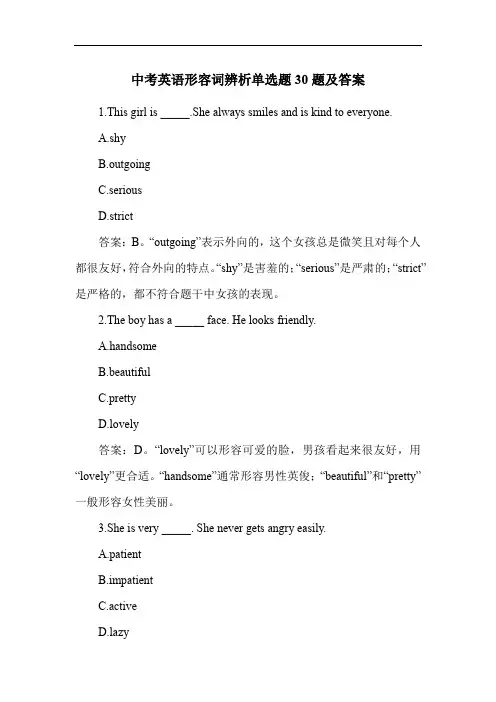
中考英语形容词辨析单选题30题及答案1.This girl is _____.She always smiles and is kind to everyone.A.shyB.outgoingC.seriousD.strict答案:B。
“outgoing”表示外向的,这个女孩总是微笑且对每个人都很友好,符合外向的特点。
“shy”是害羞的;“serious”是严肃的;“strict”是严格的,都不符合题干中女孩的表现。
2.The boy has a _____ face. He looks friendly.A.handsomeB.beautifulC.prettyD.lovely答案:D。
“lovely”可以形容可爱的脸,男孩看起来很友好,用“lovely”更合适。
“handsome”通常形容男性英俊;“beautiful”和“pretty”一般形容女性美丽。
3.She is very _____. She never gets angry easily.A.patientB.impatientC.activezy答案:A。
“patient”表示有耐心的,她从不轻易生气,说明有耐心。
“impatient”是没耐心的;“active”是活跃的;“lazy”是懒惰的,都不符合题意。
4.The teacher is _____. He always explains things clearly.A.carefulB.carelessC.patientD.impatient答案:C。
老师总是清楚地解释事情,说明有耐心。
“careful”是细心的;“careless”是粗心的;“impatient”是没耐心的,不符合老师的特点。
5.He is a _____ man. Everyone likes him.A.kindB.cruelC.meanD.selfish答案:A。
“kind”表示善良的,每个人都喜欢他,说明他善良。
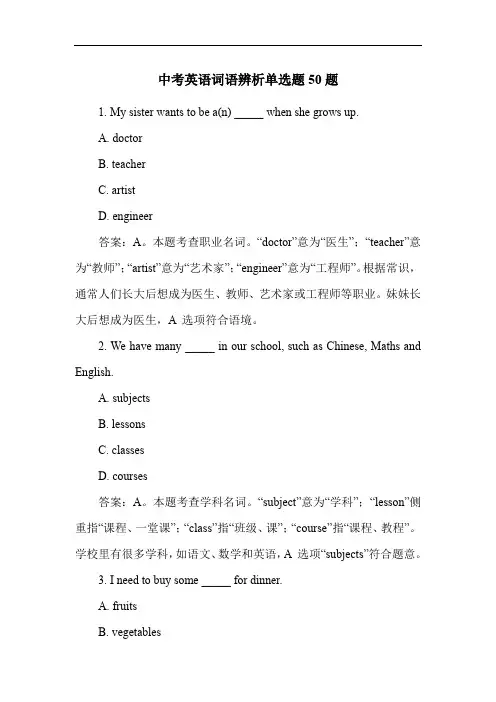
中考英语词语辨析单选题50题1. My sister wants to be a(n) _____ when she grows up.A. doctorB. teacherC. artistD. engineer答案:A。
本题考查职业名词。
“doctor”意为“医生”;“teacher”意为“教师”;“artist”意为“艺术家”;“engineer”意为“工程师”。
根据常识,通常人们长大后想成为医生、教师、艺术家或工程师等职业。
妹妹长大后想成为医生,A 选项符合语境。
2. We have many _____ in our school, such as Chinese, Maths and English.A. subjectsB. lessonsC. classesD. courses答案:A。
本题考查学科名词。
“subject”意为“学科”;“lesson”侧重指“课程、一堂课”;“class”指“班级、课”;“course”指“课程、教程”。
学校里有很多学科,如语文、数学和英语,A 选项“subjects”符合题意。
3. I need to buy some _____ for dinner.A. fruitsB. vegetablesD. eggs答案:B。
本题考查生活用品名词。
“fruits”意为“水果”;“vegetables”意为“蔬菜”;“meat”意为“肉”,是不可数名词;“eggs”意为“鸡蛋”。
晚餐需要买一些蔬菜,B 选项符合语境。
4. My father is a _____ and he works in a factory.A. workerB. driverC. cookD. farmer答案:A。
本题考查职业名词。
“worker”意为“工人”;“driver”意为“司机”;“cook”意为“厨师”;“farmer”意为“农民”。
父亲在工厂工作,是一名工人,A 选项符合。
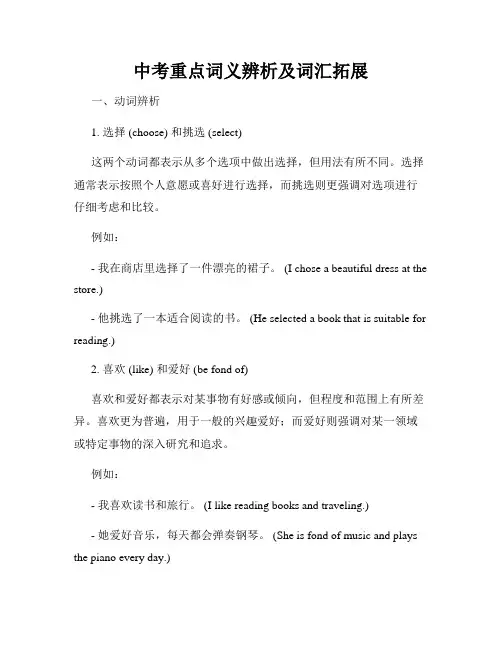
中考重点词义辨析及词汇拓展一、动词辨析1. 选择 (choose) 和挑选 (select)这两个动词都表示从多个选项中做出选择,但用法有所不同。
选择通常表示按照个人意愿或喜好进行选择,而挑选则更强调对选项进行仔细考虑和比较。
例如:- 我在商店里选择了一件漂亮的裙子。
(I chose a beautiful dress at the store.)- 他挑选了一本适合阅读的书。
(He selected a book that is suitable for reading.)2. 喜欢 (like) 和爱好 (be fond of)喜欢和爱好都表示对某事物有好感或倾向,但程度和范围上有所差异。
喜欢更为普遍,用于一般的兴趣爱好;而爱好则强调对某一领域或特定事物的深入研究和追求。
例如:- 我喜欢读书和旅行。
(I like reading books and traveling.)- 她爱好音乐,每天都会弹奏钢琴。
(She is fond of music and plays the piano every day.)3. 认为 (think) 和相信 (believe)认为和相信都表示个人的观点或信念,但有所区别。
认为多指基于观察、推理或经验的主观判断,而相信则强调对某一观点或信仰的坚定信心。
例如:- 我认为这个问题很复杂。
(I think this problem is complex.)- 她相信努力就会有好结果。
(She believes that hard work leads to good results.)二、名词辨析1. 图画 (picture) 和照片 (photo)图画和照片都指呈现出来的图像,但用法和形式上有所差异。
图画通常指手绘或绘画作品,而照片则指由相机拍摄得到的影像。
例如:- 这幅图画很美丽,充满了艺术感。
(This picture is beautiful and full of artistic sense.)- 我们合影了一张照片来留念。
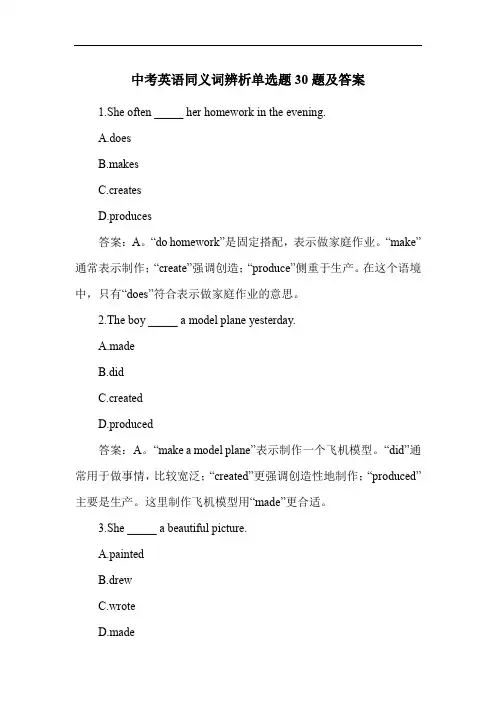
中考英语同义词辨析单选题30题及答案1.She often _____ her homework in the evening.A.doesB.makesC.createsD.produces答案:A。
“do homework”是固定搭配,表示做家庭作业。
“make”通常表示制作;“create”强调创造;“produce”侧重于生产。
在这个语境中,只有“does”符合表示做家庭作业的意思。
2.The boy _____ a model plane yesterday.A.madeB.didC.createdD.produced答案:A。
“make a model plane”表示制作一个飞机模型。
“did”通常用于做事情,比较宽泛;“created”更强调创造性地制作;“produced”主要是生产。
这里制作飞机模型用“made”更合适。
3.She _____ a beautiful picture.A.paintedB.drewC.wroteD.made答案:B。
“draw a picture”是固定搭配,表示画画。
“painted”通常指用颜料绘画;“wrote”是写;“made”表示制作,在此语境不合适。
4.He _____ an important decision yesterday.A.madeB.didC.createdD.produced答案:A。
“make a decision”是固定搭配,表示做决定。
“did”做事情太宽泛;“created”创造;“produced”生产,都不符合语境。
5.The workers _____ a lot of products every day.A.makeB.doC.createD.produce答案:D。
“produce products”表示生产产品。
“make”制作比较宽泛;“do”做事情;“create”创造,这里生产产品用“produce”更恰当。
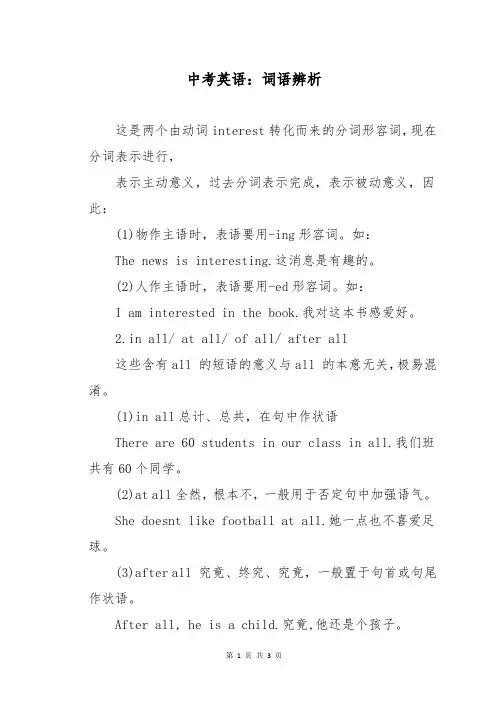
中考英语:词语辨析这是两个由动词interest转化而来的分词形容词,现在分词表示进行,表示主动意义,过去分词表示完成,表示被动意义,因此:(1)物作主语时,表语要用-ing形容词。
如:The news is interesting.这消息是有趣的。
(2)人作主语时,表语要用-ed形容词。
如:I am interested in the book.我对这本书感爱好。
2.in all/ at all/ of all/ after all这些含有all 的短语的意义与all 的本意无关,极易混淆。
(1)in all总计、总共,在句中作状语There are 60 students in our class in all.我们班共有60个同学。
(2)at all全然,根本不,一般用于否定句中加强语气。
She doesnt like football at all.她一点也不喜爱足球。
(3)after all 究竟、终究、究竟,一般置于句首或句尾作状语。
After all, he is a child.究竟,他还是个孩子。
They finished the work after all.他们最终完成了工作。
3.in time/ on time/ at times(1)in time 指实时,表示动作在规定时间内或提前发生。
We have just in time for the bus.我们正好赶上那班车。
(2)on time强调准时,正点。
The train came into the station on time.火车准点进站。
(3)at times = sometimes4.in front of 相对某物体的外部而言,说明某人或某物体在某个地方的外部的前边。
反义是:behind。
如:There are some trees in front of the classroom.教室的`外面有一棵树。
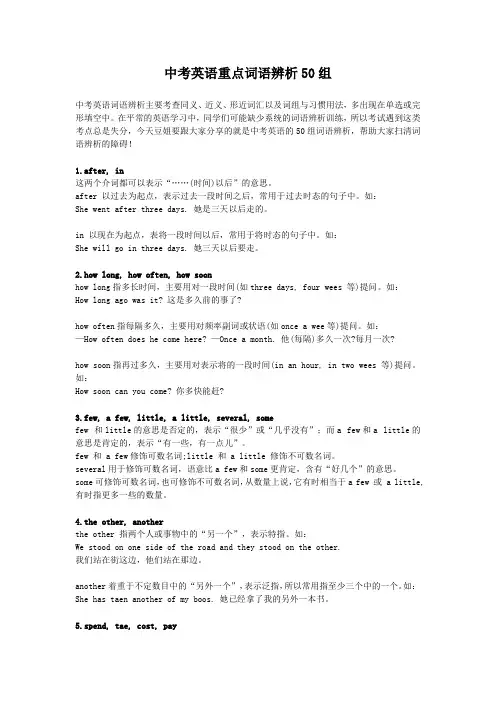
中考英语重点词语辨析50组中考英语词语辨析主要考查同义、近义、形近词汇以及词组与习惯用法,多出现在单选或完形填空中。
在平常的英语学习中,同学们可能缺少系统的词语辨析训练,所以考试遇到这类考点总是失分,今天豆姐要跟大家分享的就是中考英语的50组词语辨析,帮助大家扫清词语辨析的障碍!1.after, in这两个介词都可以表示“……(时间)以后”的意思。
after 以过去为起点,表示过去一段时间之后,常用于过去时态的句子中。
如:She went after three days. 她是三天以后走的。
in 以现在为起点,表将一段时间以后,常用于将时态的句子中。
如:She will go in three days. 她三天以后要走。
2.how long, how often, how soonhow long指多长时间,主要用对一段时间(如three days, four wees 等)提问。
如:How long ago was it? 这是多久前的事了?how often指每隔多久,主要用对频率副词或状语(如once a wee等)提问。
如:—How often does he come here? —Once a month. 他(每隔)多久一次?每月一次?how soon指再过多久,主要用对表示将的一段时间(in an hour, in two wees 等)提问。
如:How soon can you come? 你多快能赶?3.few, a few, little, a little, several, somefew 和little的意思是否定的,表示“很少”或“几乎没有”;而a few和a little的意思是肯定的,表示“有一些,有一点儿”。
few 和 a few修饰可数名词;little 和 a little 修饰不可数名词。
several用于修饰可数名词,语意比a few和some更肯定,含有“好几个”的意思。
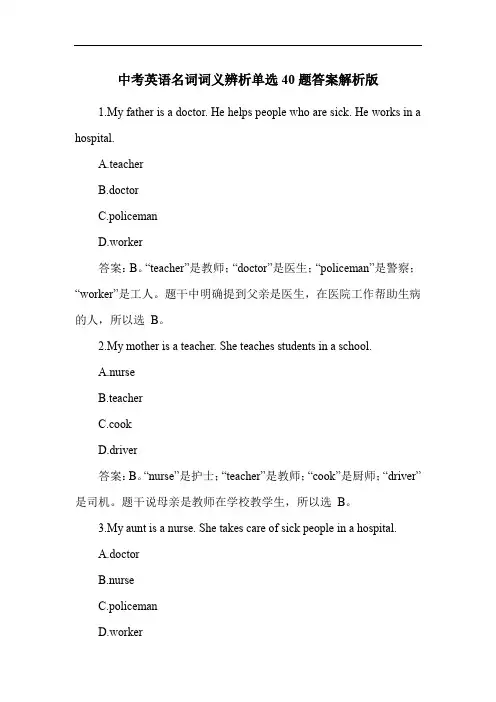
中考英语名词词义辨析单选40题答案解析版1.My father is a doctor. He helps people who are sick. He works in a hospital.A.teacherB.doctorC.policemanD.worker答案:B。
“teacher”是教师;“doctor”是医生;“policeman”是警察;“worker”是工人。
题干中明确提到父亲是医生,在医院工作帮助生病的人,所以选B。
2.My mother is a teacher. She teaches students in a school.A.nurseB.teacherC.cookD.driver答案:B。
“nurse”是护士;“teacher”是教师;“cook”是厨师;“driver”是司机。
题干说母亲是教师在学校教学生,所以选B。
3.My aunt is a nurse. She takes care of sick people in a hospital.A.doctorB.nurseC.policemanD.worker答案:B。
“doctor”是医生;“nurse”是护士;“policeman”是警察;“worker”是工人。
题干表明阿姨是护士在医院照顾病人,所以选B。
4.My uncle is a policeman. He keeps people safe.A.teacherB.policemanC.cookD.driver答案:B。
“teacher”是教师;“policeman”是警察;“cook”是厨师;“driver”是司机。
题干说叔叔是警察保护人们安全,所以选B。
5.My grandfather is a farmer. He grows crops on the farm.A.workerB.farmerC.driverD.cook答案:B。
“worker”是工人;“farmer”是农民;“driver”是司机;“cook”是厨师。
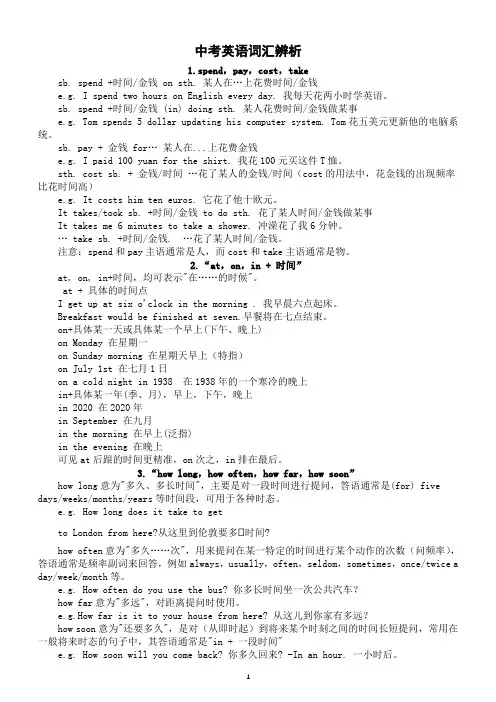
中考英语词汇辨析1.spend,pay,cost,takesb. spend +时间/金钱 on sth. 某人在…上花费时间/金钱e.g. I spend two hours on English every day. 我每天花两小时学英语。
sb. spend +时间/金钱 (in) doing sth. 某人花费时间/金钱做某事e.g. Tom spends 5 dollar updating his computer system. Tom花五美元更新他的电脑系统。
sb. pay + 金钱 for…某人在...上花费金钱e.g. I paid 100 yuan for the shirt. 我花100元买这件T恤。
sth. cost sb. + 金钱/时间…花了某人的金钱/时间(cost的用法中,花金钱的出现频率比花时间高)e.g. It costs him ten euros. 它花了他十欧元。
It takes/took sb. +时间/金钱 to do sth. 花了某人时间/金钱做某事It takes me 6 minutes to take a shower. 冲澡花了我6分钟。
… take sb. +时间/金钱. …花了某人时间/金钱。
注意:spend和pay主语通常是人,而cost和take主语通常是物。
2.“at,on,in + 时间”at, on, in+时间,均可表示"在……的时候"。
at + 具体的时间点I get up at six o'clock in the morning . 我早晨六点起床。
Breakfast would be finished at seven.早餐将在七点结束。
on+具体某一天或具体某一个早上(下午、晚上)on Monday 在星期一on Sunday morning 在星期天早上(特指)on July 1st 在七月1日on a cold night in 1938 在1938年的一个寒冷的晚上in+具体某一年(季、月),早上,下午,晚上in 2020 在2020年in September 在九月in the morning 在早上(泛指)in the evening 在晚上可见at后跟的时间更精准,on次之,in排在最后。
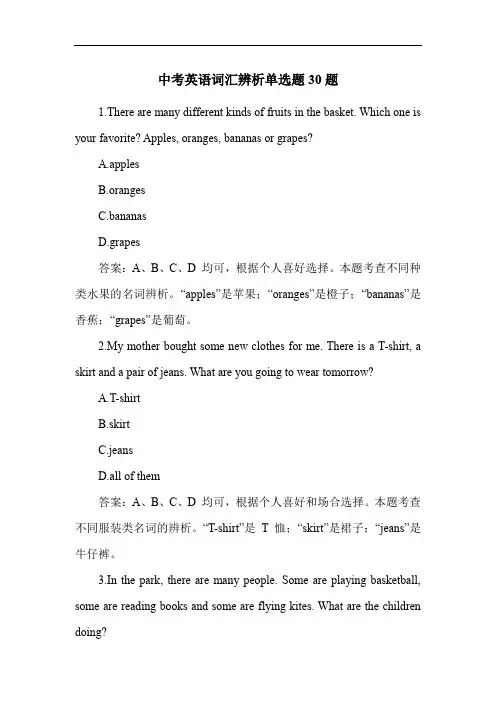
中考英语词汇辨析单选题30题1.There are many different kinds of fruits in the basket. Which one is your favorite? Apples, oranges, bananas or grapes?A.applesB.orangesC.bananasD.grapes答案:A、B、C、D 均可,根据个人喜好选择。
本题考查不同种类水果的名词辨析。
“apples”是苹果;“oranges”是橙子;“bananas”是香蕉;“grapes”是葡萄。
2.My mother bought some new clothes for me. There is a T-shirt, a skirt and a pair of jeans. What are you going to wear tomorrow?A.T-shirtB.skirtC.jeansD.all of them答案:A、B、C、D 均可,根据个人喜好和场合选择。
本题考查不同服装类名词的辨析。
“T-shirt”是T 恤;“skirt”是裙子;“jeans”是牛仔裤。
3.In the park, there are many people. Some are playing basketball, some are reading books and some are flying kites. What are the children doing?A.playing basketballB.reading booksC.flying kitesD.all of the above答案:A、B、C、D 均可,根据具体情况判断。
本题考查不同活动的名词辨析。
“playing basketball”是打篮球;“reading books”是读书;“flying kites”是放风筝。
九年级英语同义词辨析高频错题分析练习题20题含答案解析1.She tried to persuade him to change his mind, but he remained firm.- insist- persist- adhere- persevere答案解析:persist。
“persuade”表示劝说,“remain firm”表示坚持不变。
“insist”侧重于坚持某种意见或主张;“persist”强调不顾困难、反对等坚持做某事;“adhere”主要指黏附、坚持信仰等;“persevere”则侧重于坚持不懈地努力。
在这个语境中,“persist”更符合不顾他人劝说而坚持的意思。
2.He promised to finish the work on time and he fulfilled his promise.- accomplish- complete- achieve- perform答案解析:complete。
“finish”和“fulfill his promise”暗示完成任务。
“accomplish”和“achieve”更强调通过努力达成目标;“perform”侧重于执行任务;“complete”则单纯表示完成工作,最符合题意。
3.The car stopped suddenly and he had to brake hard.- halt- pause- cease- suspend答案解析:halt。
“stop suddenly”说明车突然停下。
“halt”强调突然停止;“pause”是暂停;“cease”指停止某种状态或行为;“suspend”常指暂停或悬挂。
“halt”最符合车突然停下的情景。
4.She always tries to avoid making mistakes.- escape- evade- shun- elude答案解析:avoid。
中考英语词汇辨析选择题60题1. There are many ______ in the zoo.A. monkeyB. monkeysC. monkeiesD. monkeyes答案:B。
monkey 的复数形式是monkeys,A 选项是单数形式,C 和D 选项的复数形式错误,所以选B。
2. We need some ______ to make a cake.A. flourB. meatsC. breadD. eggs答案:A。
flour 意为“面粉”,是做蛋糕需要的原料;meats 表达错误,meat“肉”是不可数名词,没有复数形式;bread“面包”不符合做蛋糕的原料;eggs“鸡蛋”虽然也是做蛋糕的材料之一,但通常还需要面粉,综合考虑选A。
3. My father reads ______ every morning.A. newspaperB. a newspaperC. some newspapersD. newspapers答案:B。
newspaper 是可数名词,“读报纸”要用“read a newspaper”或“read newspapers”,A 选项缺少冠词,C 选项“some”不符合“每天早上”的语境,D 选项没有冠词,所以选B。
4. Can you see some ______ on the table?A. appleB. applesC. an appleD. the apples答案:B。
some 后接可数名词复数或不可数名词,apple 是可数名词,所以要用apples,A 选项是单数,C 选项an 用于单数可数名词前,D 选项the 表示特指,此处没有特指的含义,所以选B。
5. There is a lot of ______ in the fridge.A. milkB. watersC. juiceD. breads答案:A。
milk“牛奶”和juice“果汁”是不可数名词,没有复数形式,B 选项waters 错误,water 是不可数名词;bread“面包”也是不可数名词,没有复数形式,D 选项breads 错误,A 选项milk 符合题意,所以选A。
初三英语语义辨析单选题20题1.My mother is busy_____the house on weekends.A.cleaningB.cleanC.to cleanD.with clean答案:A。
本题考查be busy doing sth 的用法。
“be busy doing sth”表示“忙于做某事”,A 选项cleaning 符合该用法;B 选项clean 是动词原形;C 选项to clean 一般用于be+形容词+to do sth 的结构;D 选项with clean 用法错误。
2.I often help my father_____the car on Sundays.A.washB.washingC.to washD.with wash答案:C。
“help sb to do sth”和“help sb do sth”都表示“帮助某人做某事”,A 选项wash 也可以,但C 选项to wash 更全面;B 选项washing 一般用于be busy doing sth 的结构;D 选项with wash 用法错误。
3.My sister is good at_____pictures.A.drawB.drawingC.to drawD.with draw答案:B。
“be good at doing sth”表示“擅长做某事”,B 选项drawing 符合该用法;A 选项draw 是动词原形;C 选项to draw 一般用于be+形容词+to do sth 的结构;D 选项with draw 用法错误。
4.The students are interested in_____English songs.A.singB.singingC.to singD.with sing答案:B。
“be interested in doing sth”表示“对做某事感兴趣”,B 选项singing 符合该用法;A 选项sing 是动词原形;C 选项to sing 一般用于be+形容词+to do sth 的结构;D 选项with sing 用法错误。
中考英语名词词义辨析练习题40题1<背景文章>In our school life, there are many different activities that we can take part in. We have various classes like English, math, science and so on. In English class, we learn new words and grammar rules. The teacher often uses interesting methods to make the class lively.We also have different clubs. There are art clubs, music clubs, sports clubs and more. If you are interested in painting, you can join the art club. In the art club, you can learn different painting techniques and create beautiful works of art.Sports competitions are also an important part of school life. We have basketball games, football matches and track and field events. During these competitions, students show their skills and teamwork.1. In English class, we learn new ___ and grammar rules.A. booksB. wordsC. pensD. desks答案:B。
初三英语词汇辨析技巧练习题30题含答案解析1.She does her homework carefully and never makes any _.A.mistakeB.mistakesC.problemD.problems答案解析:B。
“mistake”表示错误,“make mistakes”是固定搭配,表示犯错误;“problem”表示问题,不符合语境。
本题考查名词辨析及固定搭配。
2.There are many _ in our school library.A.bookB.booksC.penD.pens答案解析:B。
图书馆里有很多书,“book”是可数名词,“many”后接可数名词复数形式,所以选“books”。
本题考查可数名词复数形式。
3.My mother is cooking _ in the kitchen.A.mealB.mealsC.foodD.fruits答案解析:B。
“cook meals”表示做饭,是固定搭配;“food”是不可数名词,不能直接用“cooking food”;“fruits”水果在厨房做饭的语境不合适。
本题考查名词辨析及固定搭配。
4.The students are having a _ class in the classroom.A.mathB.mathsC.mathematicsD.mathematic答案解析:B。
“maths”是“mathematics”的缩写,表示数学;“math”和“mathematic”的用法不准确。
本题考查学科名词的正确表达。
5.He is good at playing _.A.footballB.the footballC.a footballD.footballs答案解析:A。
“play football”是固定搭配,表示踢足球,中间不加冠词。
本题考查固定搭配及零冠词的用法。
6.She has a lot of _ to do this weekend.A.homeworksB.workC.worksD.homework答案解析:D。
中考英语词汇辨析单选题50题1.My mother is very busy. She has a lot of housework to do every day. So she needs a/ an _____ to help her.A. assistantB. engineerC. scientistD. artist答案:A。
本题考查名词辨析。
“assistant”意为“助手”;“engineer”意为“工程师”;“scientist”意为“科学家”;“artist”意为“艺术家”。
妈妈每天有很多家务要做,所以需要一个助手来帮忙。
2.I want to buy a gift for my father on his birthday. I'm thinking about buying a nice _____.A. watchB. bookC. penD. bag答案:A。
“watch”意为“手表”;“book”意为“书”;“pen”意为“钢笔”;“bag”意为“包”。
给父亲买生日礼物,通常手表比较合适,其他选项相对比较普通。
3.There are many _____ in the park. People like to take pictures of them.A. flowersC. animalsD. buildings答案:A。
“flowers”意为“花”;“trees”意为“树”;“animals”意为“动物”;“buildings”意为“建筑物”。
公园里人们喜欢拍照的通常是花。
4.We need to buy some _____ for the picnic.A. fruitsB. vegetablesC. drinksD. snacks答案:D。
“fruits”意为“水果”;“vegetables”意为“蔬菜”;“drinks”意为“饮料”;“snacks”意为“小吃”。
最新初三中考英语词语辨析专项
一、学习目标
掌握常见动词的词义辨析
二、知识讲解
第一组词语辨析:come, be here
?[误] He has come here for three hours.
?[正] He came here three hours ago.
?[正] He has been here for three hours.
与此同类的还有borrow/lend-keep; join-be in/at; die-be dead; buy-have; leave-be away等.
如何把短暂动词变成持续的状态呢?
第二组词语辨析:spend, cost, take
(1)spend的主语通常是人,往往用于以下句型:
(sb)spend some money/some time on sth.
(sb)spend some money/some time (in) doing sth.
例句:
1. I spent fifty yuan on the coat.
= I spent fifty yuan (in) buying the coat. 我花50元买了这件大衣。
2. He spent three days on the work.
= He spent three days (in) doing the work. 他干这项工作用了3天。
或物。
(2)take常用于“占用、花费”时间,其主语通常为形式主语“it”
往往用于以下句型:
It takes/took sb.some time to do sth=sth.takes/took sb.some time.
例句:
It took me three years to draw the beautiful horses.
The work will take me two days.
(3)cost的主语必须是某物。
往往用于以下句型:sth.cost (sb.) some money。
20.
例句:The dictionary cost me £
(4)pay的主语必须是某人。
往往用于以下句型:sb. pay some money for sth.
例句:I paid 200 yuan for that pair of shoes.
小测试:请用spend, take, pay, cost进行填空练习。
1. How much does the ticket _____ from Shanghai to Beijing?
2. It will _____ us several years to learn a foreign language well.
3. How much money did you _______ on the dictionary?
4. I _____ 15 yuan for this new book last year.
第三组词语辨析:join, join in, take part in
(1)take part in 意为“参加,参与(某事物或某活动,如:movement, revolution, meeting, conference, conversation, war等)”。
例句:
1. Switzerland didn't take part in this war.
瑞士没有参加这次战争。
2. How many countries will take part in the World Cup?
有多少个国家要参加世界杯?
(2)Join意为“参加(某组织),加入(某处任职),参加到某个人群中去,从而。